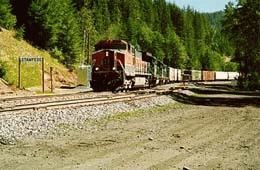On December 5, 1996, the Burlington Northern Santa Fe Railroad resumes regular train service across Stampede Pass. Service over the 78-mile line that connects Auburn with Cle Elum and Eastern Washington ended in 1983, but increases in traffic through the Ports of Seattle and Tacoma demanded more trains than the Stevens Pass and Columbia River lines could handle. Resumption of service will create auto traffic congestion in Auburn, Kent, Yakima, and other cities. Auburn will sue to get the railroad to pay the costs of resolving traffic problems, but the courts will side with the railroads, citing the preemption of interstate commerce over local interests.
The Northern Pacific Railroad's Stampede Pass first connected Auburn to Cle Elum in 1888. In 1983, the Burlington Northern Railroad (successor to the Northern Pacific) ended service over the line to save money, but did not abandon the right of way. The Burlington Northern sold 350 miles of Eastern Washington trackage to the Washington Central Railroad.
The City of Tacoma opposed efforts to make the line into a hiking trail because the line transited its watershed. In 1991, the Washington State Legislature approved $5.2 million to buy the tunnel and tracks, but the Burlington Northern declined to sell.
The increased use of containerized freight and Seattle and Tacoma's greater importance in time-sensitive trans-Pacific shipping made reopening the line feasible. Stevens Pass handled up to 25 trains a day and increased traffic on that line created environmental problems. The Burlington Northern Santa Fe (successor to the Burlington Northern) merged with the Washington Central, and refurbished the tunnel with greater height, new snow sheds, and improved communications facilities.
The City of Auburn, King County, and citizen groups protested the reopening because the line cut through Auburn with grade-level crossings. Vehicular traffic had to stop to wait for long trains to pass, creating delays for motorists and problems for emergency vehicles. Some motorists waited as long as 35 minutes for trains to pass.
In addition, the railroad proposed to reopen an intermodal yard in Auburn where containers would be transferred to trucks, adding up to 3,000 truck trips a day to Auburn streets. By law, the railroad was required to pay no more than 5 percent of costs for improvements to mitigate traffic problems and did not have to comply with local environmental ordinances.
The cities of Auburn, Kent, and Yakima sued the railroad, citing, among other things, that rail traffic would impair the city's ability to comply with air pollution regulations. In 1999, the U.S. Supreme Court refused to hear the matter, leaving the cities with a lower court decision that the cities could not exercise authority over the interstate carrier.

